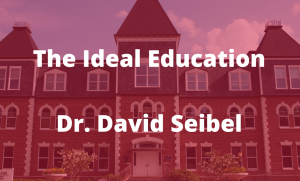I first heard the term “classical education ” two years ago. I didn’t immediately know what it meant; “fancy” came to mind. As a middle-class product of the public school system, I knew very little about private education in general, so a “classical” version was even more unfamiliar.
When I discovered Coram Deo Academy while searching for local private Christian schools on Google, it sounded foreign. I’d never learned a stitch of Latin and assumed only rich, elitist families would send their kids to a school named in an ancient language.
I imagined well-behaved children in perfectly pressed uniforms, reciting Shakespeare and quoting complete chapters of the Bible. It sounded like a “rich kid” school for people living in 8-room mansions in our county’s nicest neighborhoods.
It couldn’t be for families in 2,000-square-foot homes on the more modest side of town, right? It couldn’t be for those of us who might sincerely struggle with the cost of tuition or have never known private schools in the past.
Something drew me back to the website again and again. I visited all of Coram Deo’s social media profiles, watched every parent interview, and fell in love with the philosophy behind classical Christian education. I told myself we couldn’t afford it, but went in for a school tour anyway – just to check it out.
On the tour, I witnessed some concepts I’d been studying about classical education in action. I loved everything I heard about how lessons of virtue, character, and critical thinking are threaded into every aspect of learning. Students aren’t just learning how to solve math problems. They’re learning how to be good, kind, thoughtful, Christ-centered human beings through every subject.
The students walking by were just regular kids with wrinkled polo shirts and messy, end-of-day looks plastered on their faces in the hallway. They didn’t seem overly disciplined or elitist in attitude. Rather, they were silly, kind, curious, and distracted – as most kids are. Parents were policemen, construction managers, teachers, and accountants. I’m sure some are wealthy, but there was a deeper reason why families chose this kind of schooling for their children.
They were coming to ensure a top-notch, Christ-centered education. Like me, many have only recently learned how the classical model stands apart from traditional education in the United States.
Public schools, and even private Christian schools, see school as a way to impart knowledge and skills so one can eventually thrive in the workplace. They’re focused on student development of functional skills.
Classical school models see education as ais a deeper, more comprehensive part of human formation through learning how to think, develop wisdom and display virtue through learning. Public schools teach kids what to learn, while classical schools teach them how to learn and howbe able to thrive in any environment.
If it’s elitist to want that for your kids, then I guess I’m guilty. But I don’t think it is. I think it’s just something most people don’t realize is even available to them. Nor do they understand the lasting value in educating kids this way. I’m thankful I kept investigating because we decided classical was for families like ours – and we’re so happy we decided to enroll at Coram Deo.
– Ericka Andersen




